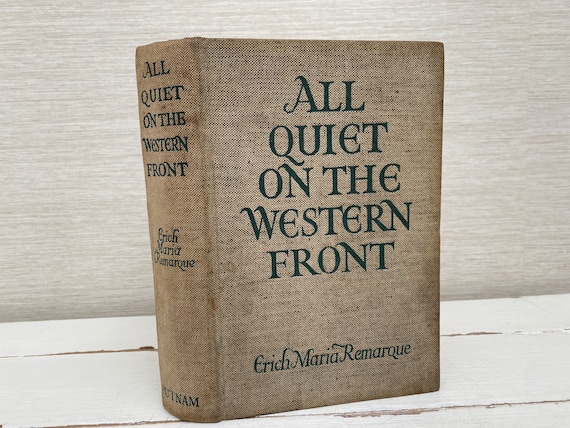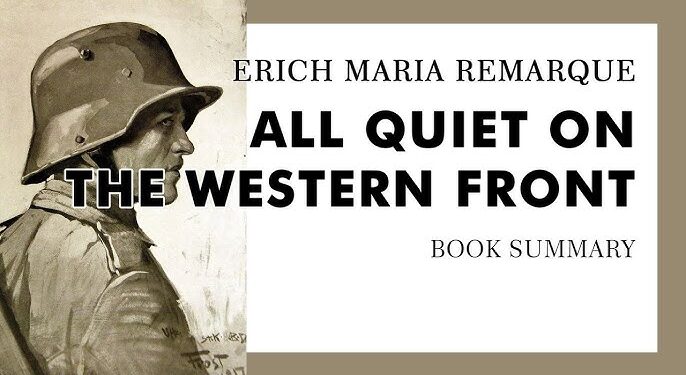Table of Contents
ToggleIntroduction
All Quiet On The Western Front By Erich Maria Remarque Erich Maria Remarque’s All Quiet on the Western Front (original German title: Im Westen nichts Neues) is one of the most powerful and enduring anti-war novels of the 20th century. Published in 1929, the novel follows the journey of Paul Bäumer, a German soldier who experiences the brutality and senselessness of World War I firsthand. Through Paul’s narrative, Remarque offers a poignant and harrowing portrayal of the physical and psychological trauma of war, exploring its dehumanizing effects on soldiers, the futility of nationalistic fervor, and the enduring emotional scars left in the wake of conflict.
The novel was groundbreaking in its unflinching realism and its rejection of romanticized war narratives. It emphasizes the stark contrast between the idealized image of war and the harsh reality that soldiers face. The novel has since been translated into numerous languages and remains relevant to contemporary discussions of war and its consequences, making it a seminal text in both literary and historical contexts.
This analysis provides a comprehensive summary of the novel, explores its major themes, and addresses frequently asked questions, offering a detailed understanding of its impact and significance.
Summary of All Quiet on the Western Front
The novel is narrated by Paul Bäumer, a young German soldier who, along with his classmates, is encouraged to enlist in the army during World War I. At the beginning of the war, Paul and his friends are swept up in the patriotic fervor that characterizes the national sentiment of the time. The older generation, particularly their teacher, advocates for duty, honor, and the glory of battle, urging the young men to fight for their country. These ideals, however, are quickly shattered once Paul and his friends are thrust into the brutal realities of trench warfare.
Read more
Training and Initial Exposure to War
Paul and his classmates undergo a grueling training regimen, where they are subjected to harsh discipline and the cruelty of their superior, Himmelstoss, a petty and sadistic figure who abuses his power over the recruits. Despite this, the soldiers maintain an initial sense of duty and optimism. However, their idealistic notions about the honor of war are soon extinguished when they arrive at the front lines.
At the front, the young soldiers face a horrific and relentless environment. They experience constant bombardment, the terror of gas attacks, and the grisly spectacle of death. Paul’s descriptions of the battlefield are visceral and graphic, painting a stark contrast to the glorious tales of heroism they had been told before the war. The soldiers are consumed by fear and a desperate struggle for survival, and the horrors of the front become their new reality.
Comradeship and Loss
One of the central themes in All Quiet on the Western Front is the bond between soldiers, which becomes both a source of strength and a tragic reminder of the brutal cost of war. Paul forms deep friendships with his fellow soldiers, including Kat, a resourceful and experienced soldier who becomes a surrogate father figure, and Kropp, his intellectual friend who questions the morality of the war. The bond they share is one of mutual dependence, as each soldier looks out for the others in the face of the constant threat of death.
Throughout the novel, Paul reflects on the deaths of his comrades, which come with alarming frequency. The soldiers’ bonds are tested as they witness the violent deaths of those closest to them, forcing them to confront the impermanence of life and the meaninglessness of war. These losses take a heavy toll on the soldiers’ mental and emotional well-being, and Paul grapples with survivor’s guilt, fear, and confusion. His inability to come to terms with the horrors he has witnessed is a central aspect of his transformation from an idealistic youth to a disillusioned, emotionally numb soldier.

Psychological and Emotional Effects of War
As the war progresses, Paul becomes increasingly detached from his former life and the civilian world. He returns home on leave and finds himself estranged from his family and friends, unable to connect with them because they cannot understand the traumatic experiences he has endured. This alienation is one of the most poignant aspects of the novel, as Paul feels like a foreigner in his own home. His experiences at the front have irreparably changed him, and he struggles to communicate his pain, fear, and grief to those who have not shared his experiences.
Despite the brief respite of leave, Paul’s return to the front is inevitable. There, he witnesses further violence and loss, culminating in his own injury and eventual death in the final chapters of the novel. His death, while tragic, is portrayed as the inevitable consequence of a senseless and brutal war, and Remarque’s final depiction of Paul’s death underscores the futility of the entire conflict.
The Futility and Absurdity of War
Throughout All Quiet on the Western Front, Remarque emphasizes the futility and absurdity of war. The soldiers fight not for a clear cause, but for survival, and the war offers little in terms of meaningful victory or purpose. The front lines are a place of constant destruction, where no one wins and everyone loses. The soldiers are reduced to mere cogs in a machine, and their sacrifices are ultimately meaningless. Through Paul’s narrative, Remarque critiques the political and social systems that perpetuate war, highlighting the dehumanizing effects it has on individuals and societies.
Read more
Themes in All Quiet on the Western Front
1. The Horrors of War
The central theme of All Quiet on the Western Front is the brutal reality of war. Remarque describes war not as a noble or heroic endeavor, but as a senseless and horrific experience that strips soldiers of their humanity. The novel depicts the horrors of battle with graphic realism, focusing on the fear, suffering, and emotional trauma that soldiers endure. The soldiers’ bodies are broken and scarred, both physically and mentally, and they are haunted by the constant threat of death.
2. The Loss of Innocence
Another prominent theme in the novel is the loss of innocence. Paul’s initial idealism about war, shaped by patriotic fervor and the encouragement of his teachers, is quickly shattered once he faces the reality of combat. The brutal experiences of war force Paul and his comrades to grow up too quickly, robbing them of their youthful innocence and turning them into hardened survivors. This loss of innocence is portrayed as an inevitable consequence of war, which destroys the lives of young men and leaves them emotionally scarred.
3. The Futility of War
Remarque critiques the futility of war throughout the novel. The soldiers are constantly engaged in battles that seem to serve no clear purpose, and their deaths are often senseless and meaningless. The novel challenges the romanticized view of war as a heroic struggle, showing instead how it is a futile and destructive force that offers no winners. The soldiers’ struggles for survival are meaningless in the larger context of the war, and their sacrifices ultimately do not lead to any meaningful outcomes.
4. Comradeship and Brotherhood
The theme of comradeship is central to the novel, as the soldiers rely on each other for support in the face of unimaginable hardship. The bonds of friendship and brotherhood that form between Paul and his fellow soldiers are the only source of comfort in the face of war’s horrors. Through these relationships, Remarque underscores the humanity of the soldiers, despite the dehumanizing effects of war. The emotional support that soldiers provide one another is crucial for their survival, both physically and psychologically.
5. Alienation and Disconnection
As Paul’s experiences at the front deepen, he becomes increasingly alienated from the world around him. His leave from the front highlights the disconnect between soldiers and civilians, as he feels like a foreigner in his own home. The emotional and psychological scars of war render him unable to connect with those who have not shared his experiences. This alienation underscores the profound personal cost of war, which isolates soldiers from their families, friends, and society.
6. The Absurdity of War
The novel presents war as an absurd and irrational force. The soldiers are caught in a senseless cycle of violence, and their lives are dictated by the whims of those in power. The random nature of death on the battlefield and the lack of clear objectives make the war seem absurd, as the soldiers fight and die for causes they do not fully understand or believe in. Remarque’s portrayal of the absurdity of war serves as a critique of the political and military systems that perpetuate it.

Conclusion
All Quiet on the Western Front remains one of the most powerful anti-war novels ever written, offering a candid and visceral portrayal of the horrors of World War I. Through the eyes of Paul Bäumer, Erich Maria Remarque presents a searing critique of war, highlighting its destructive impact on soldiers and the futility of nationalistic fervor. The novel’s themes of comradeship, loss of innocence, alienation, and the absurdity of war continue to resonate with readers, making it a timeless reflection on the human cost of conflict.
Read more
FAQ
1. What is the significance of the title?
The title All Quiet on the Western Front is ironic. It suggests a peaceful situation on the front lines, when in reality, the novel describes constant violence, fear, and suffering. The title highlights the disconnect between official reports of calm and the grim reality experienced by soldiers on the battlefield.
2. Why is Paul Bäumer’s perspective so important?
Paul’s perspective is crucial because it represents the experiences of countless young men who were thrust into war with little understanding of its true horrors. His personal transformation from an idealistic youth to a disillusioned, traumatized soldier offers a powerful commentary on the impact of war on the individual.
3. How does Remarque portray the psychological impact of war?
Remarque vividly depicts the psychological toll of war on soldiers. Through Paul’s narrative, readers witness the emotional and mental breakdowns that result from constant exposure to violence, death, and fear. Soldiers experience survivor’s guilt, trauma, and alienation, and many are unable to reintegrate into civilian life after the war ends.
4. How does the novel critique nationalism and patriotism?
The novel critiques nationalism and blind patriotism by showing how these ideals are manipulated by the older generation to send young men to war. Paul and his friends initially buy into the idea of fighting for their country, but their experiences on the front lines reveal the emptiness of these patriotic ideals.
5. What makes All Quiet on the Western Front an anti-war novel?
All Quiet on the Western Front is an anti-war novel because it portrays war as a destructive, dehumanizing, and futile experience. Remarque focuses on the individual soldier’s suffering and challenges the romanticized view of war as a noble endeavor. The novel advocates for peace and emphasizes the senselessness of armed conflict.
Read more
















